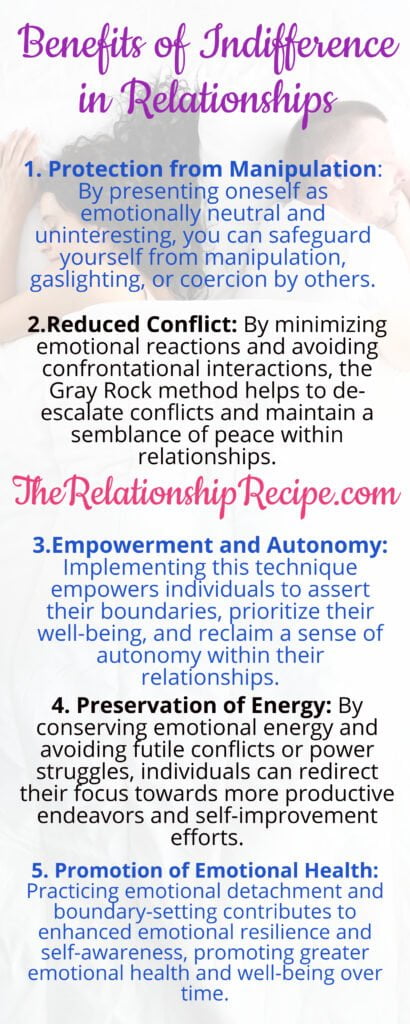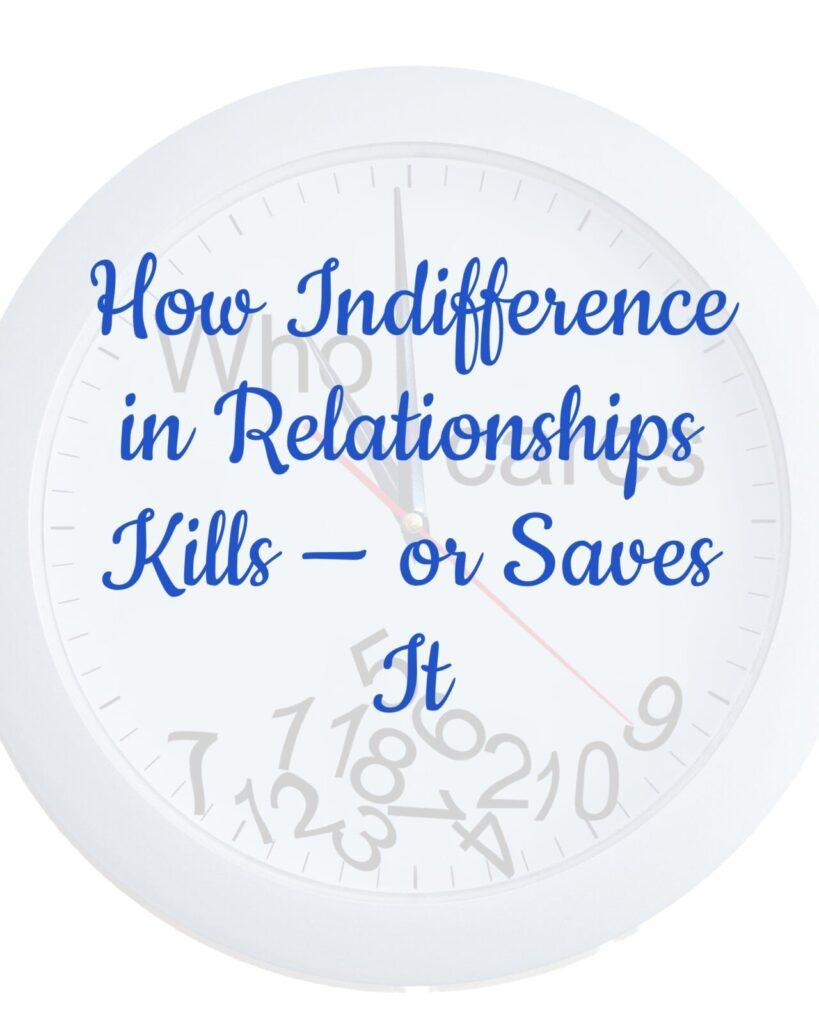Mastering Emotional Detachment: A Guide to Indifference in Relationships
Indifference in relationships doesn’t always show up like a blowout fight or dramatic cheating scandal. Sometimes, it creeps in quietly – like when your partner stops asking how your day was or stops noticing when something’s clearly wrong. It’s that cold, empty space between two people who used to be close. The emotional detachment, the going-through-the-motions, the “whatever” attitude can feel more painful than anger. At least anger means they still care.
For a lot of women, this kind of emotional detachment in relationships feels like slow suffocation. You’re not just unloved – you’re unseen. Sometimes it comes from burnout, past hurts that never healed, or just the slow drift of mismatched priorities. And while it’s tempting to write it off as just a rough patch, ignoring this kind of apathy in relationships can quietly unravel everything.
🥨But here’s the twist: sometimes a little indifference (or even using something like the Gray Rock Method) can actually protect your peace, especially if you’re dealing with manipulation or emotional abuse. So yeah, indifference in relationships can destroy love, or save your sanity. The real magic is in figuring out which one you’re dealing with.

✨ Key Highlights
- Why emotional detachment isn’t always the villain in love stories
- The double-edged nature of apathy in relationships
- A counterintuitive method that protects your peace
- Subtle red flags that speak volumes if you’re willing to look
- How to turn quiet withdrawal into powerful clarity

The Poison and Panacea of Indifference in Relationships
Is this relationship headed straight for a breakdown… or is there still hope? It’s hard to tell when the love doesn’t feel loud anymore. You start wondering, Does it have to be like this forever? What if pulling back emotionally wasn’t giving up, but actually a way to protect your peace?
Here’s the truth no one really talks about: indifference in relationships can feel like a slow death, but in the right situation, it can also be a lifeline. When you’re stuck in a toxic dynamic, sometimes a little emotional detachment isn’t cold-hearted… it’s survival. It’s choosing your sanity over chaos. Your peace over constant emotional whiplash. ✌️
Indifference is a weird one – it’s both the thing that can kill a relationship and the thing that can keep you from falling apart. That’s the paradox. It can quietly erode intimacy, but it can also act as a shield when you’re drowning in manipulation, drama, or emotional fatigue. Especially in toxic situations, knowing how to emotionally disengage, even using tools like the Gray Rock Method, can be the only thing standing between you and burnout.
When you’re caught in this delicate push-pull of closeness and distance, understanding apathy in relationships isn’t just helpful – it’s necessary. Because sometimes, pulling back is the first step toward clarity – and maybe even healing, whether that’s together or on your own.

I learned this several years ago when I was in the throes of confusion about my relationship. I was constantly upset, crying, not sleeping, blaming myself, HATING myself, etc. I think this may have been the point when I started feeling hopeless about our marriage.
Resentment in my marriage was at an all-time high. The constant conflict and upset wasn’t doing me, or him, any good. I started turning to alcohol to numb it long before that.
🫠Terrible idea.
Drinking on the daily kept me stuck in my own inability for growth – and kept me from recognizing that growth and introspection was what I needed.

I knew I couldn’t leave then, and I was desperate for some sort of reprieve from the incessant emotional upheaval. I began to get honest with myself that most of the fighting wasn’t worth it, but I didn’t know how to deal with someone who can be so high conflict.
That’s when I started thinking, “What if I just didn’t care anymore? What does that feel like? How can I get to that point, so I can save my sanity?”
Now, you may have noticed I used the word “sanity” instead of “marriage”. Believe it or not, apathy, gray rock and emotional detachment can work for you, not against you.
Look at it as a “self preservation” technique, because that is exactly what it is!

How Apathy in Relationships Shows Up
Apathy in relationships feels like waking up next to someone who’s already emotionally gone. One or both people just stop trying. There’s no more spark, no real interest, no checking in. The emotional connection that once felt alive starts to shrivel up, and in its place, there’s just this dull silence. No fights, maybe, but no passion, no care. Just… nothing. That’s the real danger of apathy. It doesn’t blow things up, it just lets them die slowly.

Signs of Emotional Indifference in Relationships
Recognizing the signs of emotional indifference is the first step toward figuring out whether your relationship’s just in a rough patch — or slowly slipping away. Here are some of the big red flags that shouldn’t be ignored:
💬 The Conversations Get Hollow
You’re not really talking anymore, not about the real stuff, anyway. Maybe the convos feel surface-level or forced… or they’ve just stopped happening altogether. And when you do bring something up, it feels like they’re not really listening.
💔 They Don’t Seem to Care Anymore
There’s a clear lack of empathy. Your feelings, your stress, your wins barely register. It’s like you’re emotionally on your own, even if they’re right there beside you.
🥀 Intimacy Is Fading Fast
The cuddles, the playful touches, the “I love you” that used to feel real starts to disappear. You feel more like roommates than partners, and the emotional loneliness hits harder than you expected.
🚪They Start Avoiding You
They spend more time on their phone, dive into work, or find reasons to be out of the house. Activities you used to enjoy together? Suddenly, they’re “too tired” or “not in the mood.”
🧱 Emotional Walls Go Up
This is full-blown stonewalling. They shut down, stop sharing, and keep everything locked up tight. No vulnerability, no openness, just walls you can’t climb over.

What is the Gray Rock Method?
The Gray Rock method is exactly what it sounds like: you become as emotionally exciting as, well… a gray rock. The whole point is to blend into the background, stay neutral, and give the other person nothing to latch onto. No reactions. No drama. Just calm, boring energy.
It started as a survival tool for people dealing with narcissists, but it’s gained traction with anyone stuck in toxic or emotionally draining relationships. If you’ve ever felt like someone thrives on your reactions – like they poke just to watch you explode – this method can come in handy.
At its core, the Gray Rock approach means keeping your responses flat and non-reactive. You’re not rude. You’re not engaging. You’re just emotionally neutral, even when they’re trying to get a rise out of you. It’s a way to protect your peace, especially when direct confrontation only makes things worse.
It’s not a long-term fix for a healthy relationship (and it shouldn’t be), but for certain situations it’s pure emotional self-defense.

How to Use the Gray Rock Method in Relationships
Using the Gray Rock method in relationships takes intention, and a whole lot of emotional discipline. It’s not about shutting down your entire personality forever. It’s about protecting your peace when you’re dealing with someone who thrives on chaos or control. Here’s how to use it without losing yourself in the process:
📍Set Boundaries Like You Mean It
Figure out what you’re okay with, and what you’re not. Then stick to it. Don’t waver, even when they try to guilt-trip or gaslight you. Boundaries are your lifeline here.
😐 Keep Your Feelings Off the Table
This is key. You don’t give them fuel. That means no emotional outbursts, no oversharing, and no letting them in on what gets to you. Stay neutral. Calm. Almost boring. If they can’t get a reaction, they lose power.
📉 Scale It Back
You don’t owe them deep conversations or emotional energy. Keep interactions short and surface-level. Just the facts. The less they know, the less they can twist.
🔄 Steer the Conversation Elsewhere
If things start getting too personal or pokey, pivot to something harmless, like the weather or what you had for lunch. The goal is to be as bland as a beige wall in a dentist’s office. Nothing to argue with, nothing to latch onto.
🎯 Stay Consistent
They might push harder when they notice the shift. Don’t bite. Stay steady. Don’t explain, don’t defend, don’t react. That’s how the method works, by boring them until they stop trying.
🛁 Take Care of You
This isn’t easy. So make sure you’re pouring into yourself elsewhere. Journal. Meditate. Go for a walk. Do things that remind you who you are and that you still get to feel joy, even in hard seasons.
🤝 Don’t Do This Alone
Lean on your people. Whether it’s a friend who gets it or a therapist who can help you untangle the mess, you need support. You’re not weak for needing help – you’re smart for not carrying this alone.

The Upside of Emotional Detachment in Relationships
Sometimes, stepping back emotionally isn’t cold, it’s survival. If you’ve ever felt drained, manipulated, or just plain exhausted in a relationship, emotional detachment can be a lifeline. Here’s why it actually helps:
🛑 It Keeps Manipulators in Check
When you stop reacting with emotion, you stop feeding the drama. Staying neutral can make it a lot harder for someone to gaslight, guilt-trip, or control you.
🔕 Less Fighting, More Peace
Reacting less = arguing less. Emotional detachment gives you space to breathe instead of jumping into every battle. You’re not avoiding; you’re protecting your peace.
🧍♀️ You Start Reclaiming You
The more you detach from their chaos, the more you reconnect with your own voice. Your boundaries matter. Your peace matters. This method helps you stop shrinking yourself to keep the peace.
💆♀️ You Save So. Much. Energy.
Not everything deserves your emotional bandwidth. When you stop pouring your energy into pointless power struggles, you have more left for the things, and people who actually refill your cup.
🧠 You Get Clearer, Emotionally and Mentally
It’s easier to hear your own thoughts when you’re not constantly in fight-or-flight. Emotional detachment helps you become more self-aware and grounded, which is exactly what you need to heal and move forward.
The Gray Rock method isn’t about turning off your humanity. It’s about protecting it. When used mindfully, it can help you stop being a target, start being your own advocate, and create space for real healing.

Final Thoughts
Indifference in relationships isn’t always the enemy. Sometimes, it’s a wake-up call – a signal that something deep needs tending to. And other times, especially in toxic or emotionally draining dynamics, it becomes a quiet form of self-preservation.
If you’re feeling emotionally detached, don’t rush to label it as wrong. Pause. Reflect. Is it burnout? A boundary? A sign of deeper wounds? Or maybe it’s your nervous system finally saying, “Enough.”
Whether you’re trying to revive a connection that matters or protect yourself from one that’s harming you, remember this: you get to choose how much access people have to your emotions, your energy, and your peace.
Emotional detachment, when used with intention, isn’t about giving up. It’s about getting clear. It’s about recognizing when to fight for something, and when to stop fighting for someone who keeps pulling you under.
You’re not cold. You’re learning how to stay warm for yourself first. And that’s not indifference. That’s strength. 💪

Before You Go…
There is a book on emotional detachment in relationships you might find helpful in not only your romantic relationship, but that with others as well:
The Magic of Detachment: How to Let Go of Other People and Their Problems
By Lyn Kelley, Ph.D.
After a lifelong struggle with being overly enmeshed in others’ issues, Lyn Kelley finally found the key to detaching with compassion. In this groundbreaking book, the renowned counselor and certified professional coach shares her step-by-step method to:
- Protect your energy and emotions from toxic people
- Set healthy boundaries without guilt or conflict
- Show genuine care while avoiding the emotional rollercoaster
- Develop spiritual fortitude to let go peacefully
This updated edition provides cutting-edge strategies based on the latest research in psychology, neuroscience, and spirituality. You’ll discover:
- The 6 types of toxic people and how to handle them
- A four-part framework for detached concern
- Highly effective anxiety management techniques
- A profound process for grieving and releasing past bonds
- 10 science-backed tips to confront stress and drama
- Powerful affirmations to cultivate authentic empowerment
- A life-changing method to find your purpose
With compassion, wisdom and humor, Dr. Kelley guides you to stop being a hostage to other people’s problems. Get this book and finally enjoy the peace and freedom you deserve!

This post may contain affiliate links. I earn from qualifying Amazon purchases at no extra cost to you.






